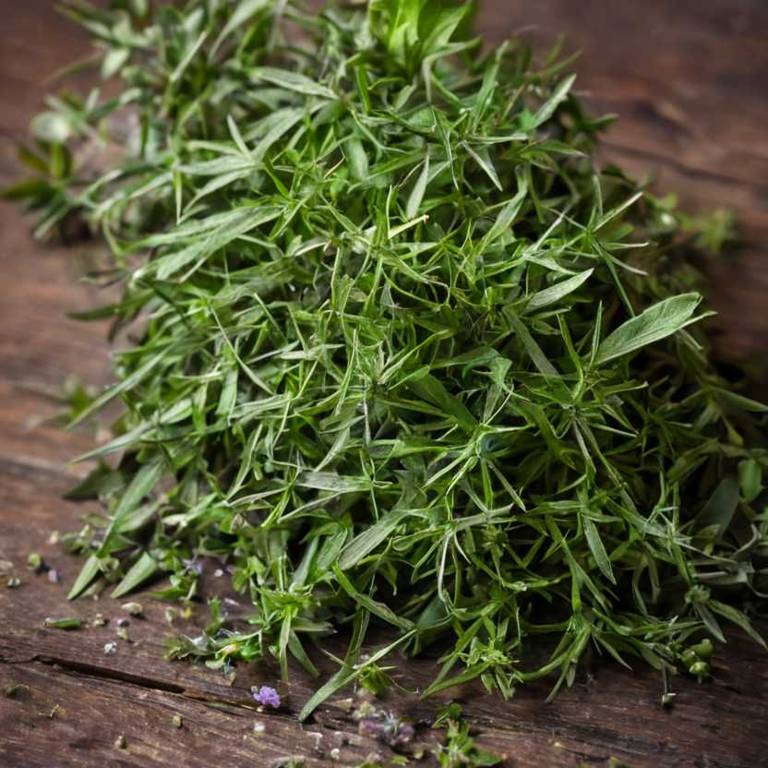By Leen Randell
Updated: Jul 17, 2024
10 Medicinal Preparations Of Hyssopus Officinalis (Hyssop)

Hyssopus officinalis has several medicinal preparations, such as teas, tinctures, and essential oils, that are useful for treating respiratory issues like bronchitis and coughs.
They are also used to soothe sore throats and can aid in digestion by relieving symptoms of indigestion and nausea. Some herbalists also use hyssop to make topical creams and ointments to alleviate skin irritations and wounds.
Its antiseptic and anti-inflammatory properties make it a popular natural remedy.
This article explains in details the 10 best medicinal preparations of Hyssopus officinalis.
1. Teas
Hyssopus officinalis teas is used to alleviate various health issues.
It has been traditionally employed to soothe respiratory problems such as coughs, bronchitis, and asthma by reducing inflammation and relieving congestion. Additionally, its antimicrobial properties make it effective in treating digestive issues like stomach ulcers and diarrhea. Furthermore, hyssop tea may help lower blood pressure, reduce anxiety, and even alleviate symptoms of insomnia due to its calming effects.
Its versatility makes it a popular natural remedy for overall wellness.
2. Decoctions
Hyssopus officinalis decoctions is used to treat various health issues.
The decoction has antimicrobial and anti-inflammatory properties that help in treating respiratory problems such as bronchitis, colds, and coughs. It can also be used topically to soothe skin irritations, wounds, and insect bites.
Additionally, the decoction is believed to have antiseptic and antibacterial properties, making it effective against infections and inflammation in the body.
3. Tinctures
Hyssopus officinalis tinctures is used to promote respiratory health by soothing coughs and relieving congestion.
The antiviral and anti-inflammatory properties of the herb help to alleviate symptoms of colds, bronchitis, and other upper respiratory tract infections.
Additionally, hyssop tincture can be used topically to treat skin irritations, wounds, and minor burns due to its antimicrobial and antiseptic properties, making it a valuable natural remedy for various health issues.
4. Oils
Hyssopus officinalis oils is used to promote overall wellness and alleviate various health issues.
The essential oil extracted from its leaves has been traditionally used for its anti-inflammatory, antibacterial, and antiviral properties. It is often employed in aromatherapy to soothe respiratory problems like bronchitis, coughs, and colds.
Additionally, it can help to calm anxiety, improve sleep quality, and support digestive health, making it a versatile natural remedy for various ailments.
5. Salves
Hyssopus officinalis salves is used to alleviate a range of health issues.
The antiseptic and anti-inflammatory properties in the salve make it effective in treating skin irritations, wounds, and minor burns. It can also be used to soothe respiratory issues such as coughs, bronchitis, and asthma by applying it topically to the chest or throat.
Additionally, hyssop salves have been traditionally used to treat digestive issues, such as indigestion and bloating, and as a natural remedy for fever reduction.
6. Liniments
Hyssopus officinalis liniments is used to treat a range of health issues.
It has anti-inflammatory and antimicrobial properties, making it effective in relieving pain and reducing swelling in joints and muscles. The liniment can be applied topically to alleviate symptoms of arthritis, sprains, and strains. Additionally, its antiseptic properties make it useful for treating skin infections, wounds, and minor burns.
It is also used to ease respiratory issues such as bronchitis and coughs.
7. Poultices
Hyssopus officinalis poultices is used to alleviate a variety of health issues.
Topically applied, it can help soothe skin irritations such as eczema, acne, and wounds, while also reducing inflammation and promoting healing. Additionally, hyssop poultices have been traditionally used to treat respiratory issues like bronchitis, coughs, and chest congestion by loosening mucus and relieving congestion.
Its antiseptic properties make it effective in treating minor burns and cuts, further solidifying its reputation as a versatile and valuable natural remedy.
8. Gargles
Hyssopus officinalis gargles is used to alleviate various throat and mouth related issues.
It has anti-inflammatory properties that help soothe sore throats, reduce swollen tonsils, and ease coughs. The antibacterial properties of hyssop gargle can also combat bad breath, gum inflammation, and mouth ulcers.
Additionally, its antiseptic qualities make it an effective remedy for reducing plaque and preventing dental cavities, promoting overall oral health.
9. Mouthwashes
Hyssopus officinalis mouthwashes is used to promote oral hygiene and combat various health issues.
It has antibacterial properties that help alleviate gum inflammation, bad breath, and mouth sores. Additionally, it can soothe sore throats and reduce the severity of colds and coughs.
Its antimicrobial effects also make it effective in treating tongue tie and lip tie, promoting healthy oral mucosa and gums.
10. Syrups
Hyssopus officinalis syrups is used to alleviate various health issues.
It has anti-inflammatory and antibacterial properties that make it effective in treating sore throats, coughs, and respiratory problems. The syrup can also be used topically to soothe skin irritations, wounds, and burns. Additionally, it is believed to have antispasmodic properties, making it a natural remedy for digestive issues such as cramps and bloating.
Its antimicrobial properties make it effective against mouth ulcers and gum infections.